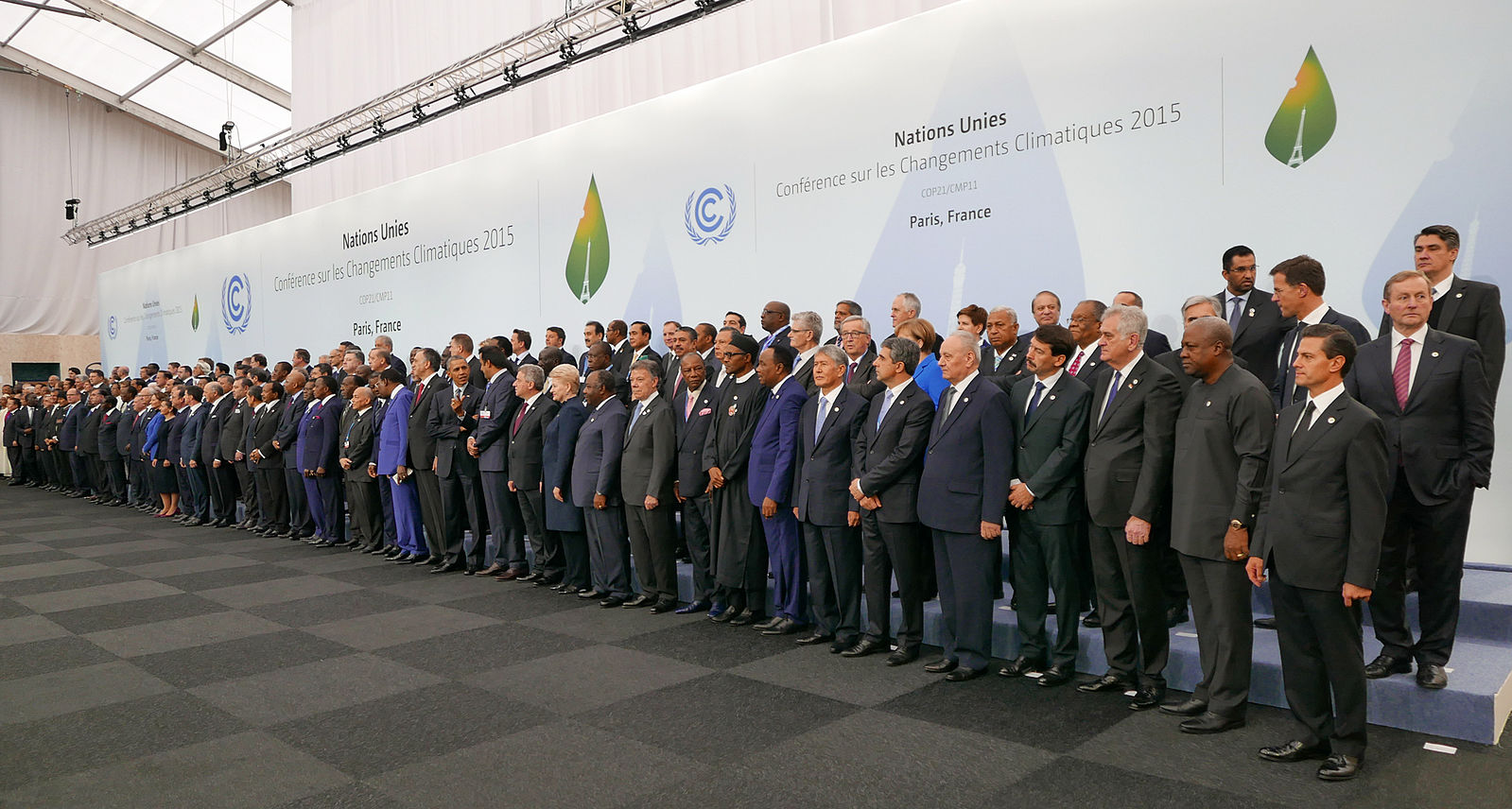While Trump Pledges Withdrawal from Paris Agreement on Climate, International Law May Provide a Safety Net
Now the other shoe has dropped and President Trump has announced his intention to withdraw the United States from the Paris Agreement.

Published by The Lawfare Institute
in Cooperation With

Now the other shoe has dropped and President Trump has announced his intention to withdraw the United States from the Paris Agreement. He also, notably, announced his intention to refrain from delivering the $2 billion remaining on the U.S.’s pledge to the Green Climate Fund associated with the UN-sponsored climate regime, as well as to attempt to renegotiate an agreement that the President says is a bad deal for the United States.
Against the background of very substantial policy questions as to whether withdrawal is in the national and global interest, the legal structure of the Paris Agreement and the multilateral climate regime in which it is embedded provides a moderating influence on the effect of U.S. withdrawal from what was intended as a universal pact directed at the truly worldwide problem of climate degradation and disruption.
Despite some confusion in the popular press, the Paris Agreement is a treaty binding under international law. But it contains non-binding elements, both in its text—indicated by the hortatory formulation “should” as opposed the language of legal obligation indicated by “shall”—and in the all-important nationally determined contributions (NDCs)—not “commitments”—containing pledges of intended emissions reductions.
As with most multilateral agreements, the Paris Agreement contains a provision for withdrawal or denunciation, similar to a unilateral termination clause in a contract, to allow those states that cannot or choose not to continue to comply to relieve themselves of the legal obligations that they undertook when becoming party to the instrument. The provisions of the Paris Agreement are far from unusual in specifying that a party may give notice of withdrawal after the Agreement has been in force for it for three years, which then becomes effective a year after that. (It does not appear that Mr. Trump intends to invoke the one-year withdrawal provision in the governing Framework Convention on Climate Change, which raises different legal questions.)
The reasons that international law has developed to include standard provisions like this are not difficult to discern. First, every international agreement involves a reciprocal flow of rights and obligations, which in turn creates expectations among the treaty partners. If a party to a multilateral treaty withdraws, as Mr. Trump has said he intends to do on behalf of the United States, that disrupts the legitimate expectations of other parties. In return for allowing states to withdraw unilaterally, a provision such as that in the Paris Agreement specifying a waiting period is only fair to the other parties to the deal—especially a relatively new one such as the Paris Agreement—in that it provides time for them to adjust to the anticipated disruption.
Second, a waiting period such as the one in the Paris Agreement provides an opportunity for a state to change course in light of subsequent developments, whether political or legal. For example, a state may decide that, having given notice of its intent to withdraw from a multilateral agreement, it nonetheless chooses to remain a party, whether as a result of further efforts at compliance, reactions from other treaty partners, domestic political changes, or simply after further reflection during a “cooling off period” (a concept perhaps particularly appropriate to a discussion of climate change).
In the context of the Paris Agreement, this structure provides a number of useful insights—all of which, as intended, exert a moderating influence on what might appear in retrospect to have been a rash decision in the heat of the political moment. They may also create quite a bit of unintended discomfort for the Trump presidency.
The Paris Agreement entered into force for the United States on November 4, 2016, as for the EU, China, Brazil and other states that had ratified prior to that date. That means that, regardless of the date on which the United States gives formal notice of its intent to withdraw from the Paris Agreement, the earliest the one-year period could commence would be in November 2019. Although that does not appear to be his intention, the President could consequently delay giving formal notice of the U.S. intent to withdraw for another two-and-a-half years without altering its legal effect. And Trump’s notice of withdrawal consequently could take effect at the soonest in early November 2020—but only after the next presidential election.
In terms of politics, this means that Trump’s abandonment of the Paris Agreement, not yet having taken effect and still subject to reconsideration, could well be a live issue during the next presidential campaign. It is not difficult to imagine that the timing of the effect of the U.S. withdrawal could well be a gift to aspiring presidential candidates from both parties, entirely contrary to Trump’s own interest in securing a second term.
In the meantime, meaning all of his current term, the President will have to confront the fact that the U.S. continues to be bound by the Paris Agreement, to which it would remain a party. As the reaction to Trump’s anticipated action from both our allies and other countries shows, so long as the formal effect of U.S. denunciation of the Paris Agreement is in the legal limbo of pending but not yet final, the issue of U.S. withdrawal may well persist as a festering foreign policy issue. And so long as the United States continues to be bound by the Agreement over at least the next four years, it is reasonable for other parties to expect it to perform on its obligations under the Agreement. The waiting period also provides an opportunity for U.S. representatives to remain engaged with the implementation of the pact, pending the effect of denunciation in 2020.
The President also announced his intention to renegotiate the Paris Agreement if possible, apparently after notice of the U.S.’s intended withdrawal. While perhaps reasonable in a context such as NAFTA, which has only two other parties, in the setting of the global climate negotiations such a proposal is a red herring. The Paris Agreement is the product of a quarter century of intense negotiations, including the Kyoto Protocol which the United States declined to ratify. To expect the entire world to commence yet a new round of negotiations at the request of one state—even one as important to the issue and politically powerful as the United States—is simply not a reasonable expectation.
The modest requirements of the Paris Agreement have been largely overlooked during the Agreement’s transformation into a political football. Much of the Agreement is not legally binding, and those provisions that are involve primarily reporting and updating each country’s voluntarily identified “contribution”—purposely not a commitment that is legal enforceable. The Agreement’s generality and flexibility, in response to U.S. demands and experience with Kyoto, is a principal reason the deal was launched so quickly, less than a year after its adoption in December 2015.
Quite simply, the Paris Agreement puts “America First,” with our domestic policy agenda driving U.S. engagement with the Agreement and not the other way around. During the lengthy public debate leading to the President’s recent announcement, even the principal negotiator for the United States concluded that the existing agreement could accommodate a relaxation of the U.S. contribution of the sort anticipated by Trump’s recent domestic proposals.
A more constructive alternative to a wholesale renegotiation can be accommodated entirely within the Paris structure. Like many modern multilateral treaties, the Paris Agreement anticipates amendments to it. If the Trump Administration could identify proposed modifications to the Agreement, there is every reason to believe that they would find a receptive audience among the other parties to the Agreement, which marked a reengagement of the United States after the unfortunate experience of Kyoto.
Even so, it is difficult to imagine changes that would make the Paris Agreement acceptable to the Trump Administration. The President’s identification of the “draconian financial and economic burdens the agreement imposes on our country” is simply a caricature of the Paris Agreement, which instead is built up from each state party’s voluntary and nationally self-identified non-binding emission reduction goals.
None of this is to suggest that Trump’s momentously abrupt and ill-considered action is without effect, only that it is not necessarily the end of the story. International law, developed over centuries of interactions among nations with leaders with egos and agendas at least as large as Donald Trump’s, has evolved precisely to ensure continuity among the community of states and to moderate the effect of major disruptions such as Trump’s recent announcement. If these mechanisms are utilized as intended by both domestic and international constituencies, the planet and the climate may yet survive Trump’s frontal assault.





